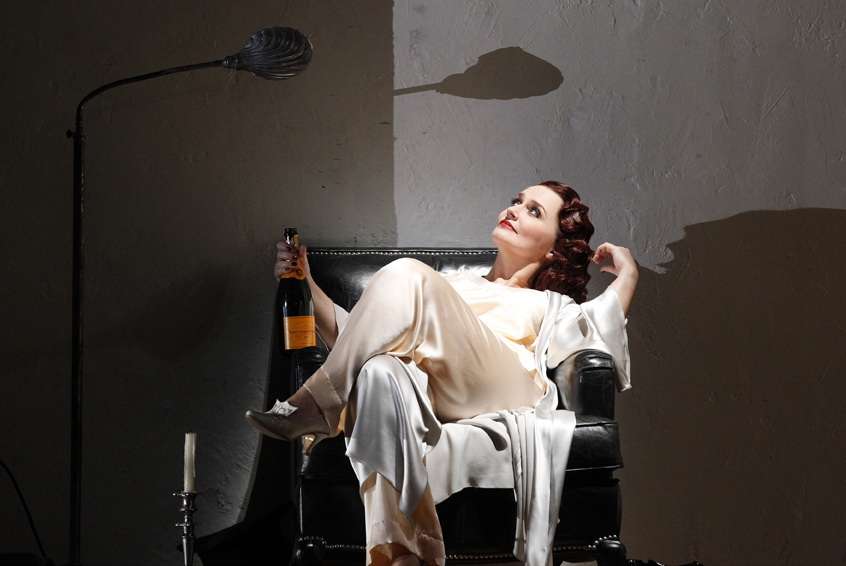|
Back
A Rare and Sparkling Gem Melbourne
State Theatre
05/02/2013 - & May 4, 6*, 8, 2013
George Frideric Handel: Partenope, HWV 27
Emma Matthews (Partenope), Catherine Carbo (Arsace), Victoria Lambourn (Rosmira), Christopher Field (Armindo), John Longmuir (Emilio), Richard Anderson (Ormonte)
Anthony Hunt (Harpsichord), Dianne Froomes (Cello), Tommi Anderson (Theorbo), Orchestra Victoria, Anthony Legge (Conductor)
Christopher Alden (Director), Andrew Lieberman (Set Designer), Jon Morell (Costume Designer), Adam Silverman (Lighting Designer)

E. Matthews (© Jeff Busby/OA)
Handel’s comedy Partenope is the final offering in Opera Australia’s Melbourne Autumn Season. Produced in partnership with the English National Opera, this production has been given in Sydney but debuts in Melbourne this season. Expectations ran high given that Emma Matthews (soprano), and the show as a whole have won Helpman Awards – Australia’s highest accolade for the performing arts.
This is a little known Handel opera but one which is easy to like because of the succession of memorable melodies and the sparkling good humour of the production. The opera premiered in London in 1730 and this English Language production draws inspiration from Paris in the 1920’s. Dali, Dada, Man Ray and the entire Art Deco palette are referenced in this spare, witty and somewhat bittersweet production. On a glaringly white stage, designer Andrew Lieberman sets the action on a huge stair case in the first act and around a toilet in the second, while the final act sees the construction of a giant pixilated version of one of Man Rays’ portraits on a massive blank wall.
The plot concerns the marital fate of Partenope, the Queen of Naples as she plays one potential suitor off against another, eventually having to choose between Arsace, Prince of Corinth (a trouser-role sung by a mezzo) and Armindo, Prince of Rhodes (sung by a countertenor). Set against a background of war between two states caused by Partenope’s spurning of another suitor Emilio, the real concerns of the comedy are love, lust, betrayal and revenge. Relationships become impossibly convoluted as Arsace’s previous lover Rosmira, disguised as a man, is found to be one of Partenope’s suitors. Emilio declares war when his bullying of Partenope fails to win her and the entire plot becomes a “battle of the sexes” with the heroine defeating her warlike admirer and eventually gaining the upper hand in all her dealings with the male characters. Sounds ridiculous? But wait, there’s more: drunkenness, sex and toilet paper are distributed widely throughout just to make the most of every comic opportunity.
Associate Music Director of Opera Australia Anthony Legge conducted a sparkling performance. Precise, subtle and driving a firm momentum. The Continuo added a restrained and lilting accompaniment to the many long recitative passages. The entire performance was notable for the crispness and balance of the orchestral sound.
With no chorus, the opera is entirely dependent on the abilities of the six soloists to incorporate sufficient diversity in their delivery to engage and hold a modern audience into what could become a quaint, antique genre. The director requires great variety: Partenope delivers solos from table tops, balconies, and the floor; Arsace and Rosmira from within a public toilet; Emilio from up a ladder and in a range of torturous yoga poses; and Armindo either sliding backwards down a staircase or stripping to near nudity high on a balcony. This is not an ordinary performance of a Handel opera by any means.
Emma Matthews is doubtlessly the star of the show for the dazzling, brilliant sheen she achieves in her voice. Her upper register is refined and delicate but capable of impressive power and she is equally able to deliver humour, pathos and fury within any given piece. The witty and biting translation allowed Ms Matthews many opportunities to play the comic turn and she took every advantage of it.
As the tormented suitor Arsace, Catherine Carbo achieves a compelling portrait which hovers between traitor, liar and lover. Her voice has a seamless quality allowing her to reach commanding highs and plunge effortlessly into rich and soulful lows. Ms Carbo received a very enthusiastic audience response for her performance.
Countertenor Christopher Field has several important solo numbers and an equally large contribution in pairings with the other characters. He has a strong and confident voice with a rich and precise upper register. It was a pleasure to hear this particularly beautiful voice next to Ms Matthews.
John Longmuir stepped in as Emilio because of the indisposition of Kanen Breen. He gave a strong performance of a physically and vocally demanding role. Christopher Alden recast him as a photographer who stalks the other characters, capturing their intimacies and foibles and screening them for the world to see. He is somewhere between a voyeur and a creative genius with many visual references to Surrealism and Dadaist art.
Victoria Lambourn’s portrayal of Rosmina disguised as Eurimene (another of Partenope’s suitors) was as strong a representation of the “woman scorned” as it was a powerful vocal statement. She was assured and poised in her delivery of the torment of the spurned lover during the solo passages and contributed solidly to the ensembles.
Baritone Richard Anderson bore the brunt of many of the visual jokes not least was the outrageous, hooped skirt costume in the final act. He has a rich, dark voice which balanced well with the other soloists.
In this production, Opera Australia have turned Handel’s gentle comedy into a “laugh-out-loud” riot, struck through with a razor-wit translation by Amanda Holden. The singing was exquisite, the orchestral playing stunningly good and the audience reaction rapturous.
Gregory Pritchard
|